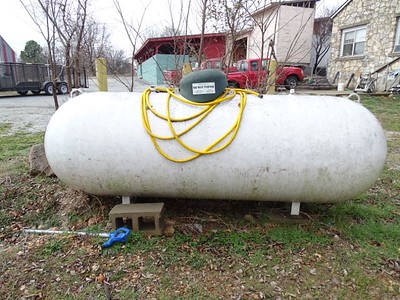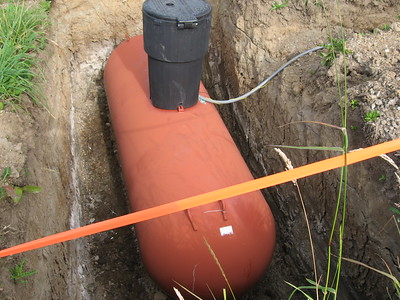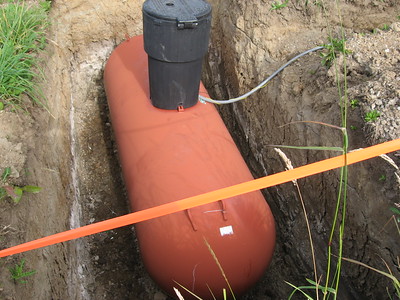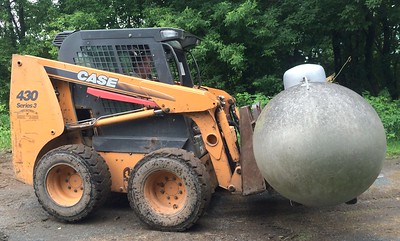It is important to know how old can a 250-gallon propane tank be because it can help you plan for the future and ensure that you have a reliable and safe source of fuel. As propane tanks age, they can become corroded or damaged, which can lead to leaks or other issues that can be dangerous. Knowing the expected lifespan of your tank can help you determine when it may need to be replaced or repaired, which can help to ensure that it is safe and reliable.
Additionally, some states have laws or regulations that require the replacement of propane tanks after a certain number of years, so knowing the life expectancy of your tank can help you comply with these requirements. In general, the life expectancy of a 250-gallon propane tank can vary depending on factors such as the type of tank, the quality of the installation, and the level of maintenance and care that the tank receives.
How old can a propane tank be depends on whether the installation is aboveground or underground:
Aboveground Propane Tank

It is generally true that properly maintained, high-quality propane tanks and cylinders can last for a long time. Galvanized steel tanks, in particular, are known for their durability and can last for 30 years or more with proper maintenance. Aluminum and composite cylinders may also have a longer lifespan than other types of tanks, as these materials are resistant to corrosion and wear and tear.
However, it’s important to note that the actual lifespan of a propane tank or cylinder will depend on a number of factors, including how well it has been maintained, how it has been stored, and the conditions under which it has been used. It’s always a good idea to have your propane tank or cylinder inspected regularly and to follow the manufacturer’s recommendations for maintenance to help ensure its longevity.
Underground Propane Tank

Underground propane tanks have a shorter lifespan than aboveground tanks due to their exposure to soil, moisture, and other potential hazards. The average lifespan of an underground propane tank can range from 20 to 30 years, depending on various factors such as the soil type, the quality of the installation, and the level of maintenance and care that the tank receives.
Soil type is an important factor because certain types of soil, such as clay or soil with a high water table, can be more corrosive and may cause the tank to rust or degrade more quickly. Proper installation is also critical because if the tank is not installed correctly, it may be more prone to leaks or other problems that can shorten its lifespan. Proper maintenance and care, including regular inspections and timely repairs, can also help to extend the life of an underground propane tank.
Factors That Can Affect the Lifespan of a Propane Tank
There are several factors that can affect the lifespan of a propane tank:
- Corrosion: If a propane tank is exposed to moisture, it can become corroded over time, which can weaken the tank and make it more prone to leaks or ruptures.
- Wear and tear: Propane tanks are subjected to a lot of wear and tear as they are used and transported. This can weaken the tank and shorten its lifespan.
- Maintenance: Proper maintenance of a propane tank is important to ensure that it lasts as long as possible. This includes regularly checking the tank for leaks and damages, and having it inspected by a professional as needed.
- Storage: Proper storage of a propane tank is important to extend its lifespan. This includes storing the tank in a dry, well-ventilated area and keeping it away from sources of heat or flame.
- Use: The conditions under which a propane tank is used can also affect its lifespan. For example, if the tank is subjected to extreme temperatures or is used frequently, it may have a shorter lifespan than a tank that is used less frequently or under more moderate conditions.
How to Determine the Age of Tank
There are a few ways to determine the age of a propane tank:
- Look for the serial number: Propane tanks also have a serial number stamped on them, which can be used to determine the date of manufacture. You can usually find the serial number on the collar of the tank.
- Check the manufacturer’s website: Some manufacturers provide information on their websites about how to determine the age of a propane tank based on the serial number. You may be able to find this information by searching the manufacturer’s website or contacting them directly.
- Have it inspected by a professional: If you are unable to determine the age of a propane tank using the methods listed above, you may want to have it inspected by a professional. A certified propane technician will be able to determine the age of the tank and assess its condition to determine if it is still safe to use.
The Aging Process of Propane Tanks
The aging process of propane tanks, particularly the 250-gallon variety commonly used for residential and commercial purposes, involves several key factors and indicators that owners should be aware of to ensure safety and efficiency.
How Propane Tanks Age Over Time
- Material Degradation: Propane tanks are usually made from steel, a material that can degrade over time. This degradation typically manifests as rust and corrosion, primarily due to exposure to environmental elements like moisture, air, and varying temperatures. Over the years, this corrosion can weaken the structural integrity of the tank.
- Environmental Impact: The rate of aging in a propane tank is significantly influenced by its environment. Tanks exposed to harsh weather conditions, such as extreme cold, heat, or coastal air with high salt content, tend to age faster. Furthermore, if a tank is placed in an area where it is constantly exposed to water or buried underground without proper protection, it is more susceptible to rust and corrosion.
Signs of Aging and Wear in 250 Gallon Propane Tanks
- Visual Indicators: One of the most apparent signs of aging in propane tanks is the appearance of rust and corrosion on the exterior. Other visual indicators include dents, scrapes, or discoloration. These signs suggest that the tank may be weakening and potentially developing structural issues.
- Structural Integrity: Over time, the tank may develop leaks or cracks. These are more difficult to detect but are critical signs of aging. Pressure testing by professionals can help identify such structural weaknesses.
- Functional Issues: Aging tanks might experience problems with the propane delivery system. Issues such as inconsistent fuel flow or challenges in maintaining proper pressure can indicate aging or wear in the tank’s mechanisms.
Safety Risks Associated with Older Tanks
- Increased Risk of Leaks: As tanks age, the risk of propane leaks increases. These leaks pose significant safety hazards, including the risk of fire or explosion, especially if the tank is located near ignition sources.
- Regulatory Compliance: Older tanks may not meet current safety standards and regulations. As safety standards evolve, older tanks can become non-compliant, increasing legal and safety risks.
- Preventative Measures: To mitigate these risks, it’s vital to conduct regular inspections and maintenance. Qualified professionals can assess the condition of the tank, perform necessary repairs, and recommend replacement if needed.
As propane tanks age, they are subject to material degradation and environmental impacts, which can lead to visible wear and potential structural issues. These changes increase safety risks, particularly concerning leaks and compliance with current regulations. Regular inspections and maintenance by professionals are crucial in managing these risks and ensuring the safe operation of the tank.
Maintenance Tips for Extending Tank Lifespan
Maintaining a 250-gallon propane tank properly is essential for ensuring its longevity, safety, and efficiency. Here are some maintenance tips and best practices:
Regular Inspection and Maintenance Routines
- Scheduled Inspections: Establish a regular schedule for inspecting your propane tank. This includes checking for any signs of wear, corrosion, or damage. Annual inspections by a qualified professional are recommended.
- Pressure Testing: Periodic pressure testing should be performed to ensure that the tank can safely hold propane without any leaks. This is often done during professional inspections.
- Check for Rust and Corrosion: Regularly inspect the tank for any signs of rust or corrosion, especially in areas that are hard to see or reach. This is crucial for tanks that are partially or fully buried.
- Paint and Coatings: To protect the tank from the elements, keep its paint in good condition. If the paint is chipping or peeling, repaint the tank with a rust-inhibiting paint suitable for propane tanks.
Tips for Preventing Corrosion and Damage
- Proper Placement: Ensure the tank is placed in a well-ventilated area and on a stable, non-corrosive base like concrete. Avoid direct contact with soil or areas prone to water pooling.
- Environmental Protection: If the tank is in an area with harsh weather conditions, consider using protective covers or shelters that don’t impede ventilation.
- Avoid Physical Damage: Keep the area around the propane tank clear of debris and overgrowth. Avoid hitting or knocking the tank with vehicles or heavy equipment.
- Cathodic Protection: For buried tanks, cathodic protection can prevent corrosion. This method uses electrical currents to counteract the corrosive activity in the soil.
When to Consult a Professional
- Annual Inspections: Have a certified technician inspect your tank annually. They can perform more thorough checks, including pressure testing and assessing safety valves.
- Signs of Serious Wear or Damage: If you notice significant rusting, dents, or other forms of damage, consult a professional immediately. Do not attempt to repair these issues yourself.
- Upgrading or Replacing Parts: If parts need upgrading or replacing (like regulators, gauges, or connectors), hire a professional. Incorrect installation can lead to serious safety hazards.
- Considering Tank Replacement: Consult with a professional if your tank is nearing the end of its expected lifespan or if repeated issues arise. They can advise on whether it’s more economical and safer to replace the tank.
Regular maintenance and inspections, combined with proactive measures to prevent corrosion and damage, are key to extending the lifespan of your propane tank. Always prioritize safety and consult professionals for inspections, repairs, or replacements.
Signs that a Propane Tank Needs to be Replaced
There are a few signs that a 250-gallon propane tank may need to be replaced:
- Visible rust or corrosion: If you notice visible and significant rust or corrosion on the exterior of the tank, it may be a sign that the tank is deteriorating and needs to be replaced.
- Leaks: If you notice a gas leak or smell gas coming from the tank, it is important to have it inspected immediately. If the leak cannot be repaired, the tank will need to be replaced.
- Dents or damage: If the tank has been damaged, for example by being dropped or hit by a vehicle, it may need to be replaced. Even small dents or scratches can weaken the tank and make it more prone to leaks or ruptures.
- Age: As mentioned earlier, propane tanks have a limited lifespan and will eventually need to be replaced. If the tank is over 15-20 years old and has not been properly maintained, it may be time to consider replacing it.
- Difficulty getting it refilled . As a rule of thumb, if you’re having difficulty getting your tank refilled, it’s a sign that you need to replace it. This is because the tank is no longer able to hold the amount of propane that you need, and is therefore not as efficient as it once was. There are a few things that you can do to prolong the life of your tank, such as regularly checking for leaks and making sure that the valves are clean and free of debris. However, if you find that you’re constantly having to get your tank refilled, it’s probably time to invest in a new one.
The Process of Safely Decommissioning and Replacing an Old Tank
- Consult a Professional: Always engage a certified technician or a reputable propane supplier for tank replacement.
- Safety First: The professional will ensure that all propane is removed from the tank before decommissioning.
- Disconnection and Removal: The technician will safely disconnect the tank from all lines and systems, ensuring no residual gas is left.
- Transportation: The old tank will be transported safely by the service provider, adhering to all transportation regulations.
- Installation of the New Tank: A new tank will be installed following all safety guidelines, including proper placement, connection, and testing.
- Testing and Inspection: The new setup will be thoroughly tested for leaks and inspected to ensure compliance with safety standards.
Options for Eco-Friendly Disposal or Recycling
- Recycling the Old Tank: Many parts of a propane tank can be recycled. The service provider can advise if the tank is eligible for recycling and facilitate the process.
- Proper Disposal: If recycling is not an option, the tank must be disposed of according to environmental and safety regulations. Your service provider will handle this, ensuring that the tank is disposed of in an eco-friendly manner.
- Repurposing: In some cases, old tanks can be repurposed for non-propane uses, though this should only be done following professional advice and ensuring all gas residues are removed.
Replacing an old propane tank involves careful consideration of its condition, age, and compliance with regulations. It’s a process that should always be handled by professionals, from safely decommissioning the old tank to installing and testing the new one. Exploring eco-friendly options for disposal or recycling is also a responsible step in this process.
It’s always a good idea to have your propane tank inspected by a professional if you have any concerns about its condition. They will be able to assess the tank and let you know if it needs to be replaced.
To Make a Conclusion
The answer to how old a 250-gallon propane tank can be depends on a number of factors. The first factor is the type of tank. There are two common types of 250-gallon propane tanks: above-ground tanks and underground tanks. Above-ground tanks have an average lifespan of 30 years or more, while underground tanks have an average lifespan of 20 to 30 years.
Another factor that affects the lifespan of a 250-gallon propane tank is the environment in which it is stored. Tanks that are stored outdoors are exposed to the elements, which can accelerate the aging process. Tanks that are stored indoors or in a temperature-controlled environment will last longer.
Finally, the care and maintenance of the tank will also affect its lifespan. Regularly inspecting and cleaning the tank will help it last longer. With proper care and maintenance, a 250-gallon propane tank can last for many years.

Mike is an experienced propane technician with over 15 years of professional experience in the field. He has dedicated his career to helping customers with their propane needs, from installation to maintenance and repair. Together with Jeremy, he co-founded this website to provide useful information and guidance to customers seeking reliable propane services.



